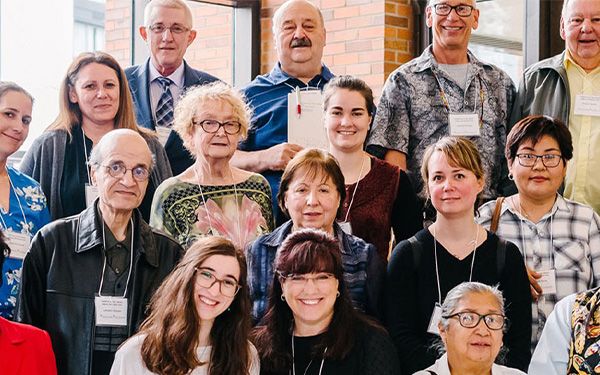When Timing Matters: Reflections from the TIMED Meeting in the Netherlands

Posted date: November 18, 2025 |
November 10th-14th, members of Diabetes Action Canada travelled to Wageningen, Netherlands, to join colleagues from across Canada and the Netherlands for the end-of-grant meeting of the Right Timing to Prevent Type 2 Diabetes (TIMED) Consortium. The gathering marked an important milestone in a collaboration that brings together world-leading chronobiologists, clinicians, implementation scientists, and Patient Partners who have worked collectively to understand how the timing of daily behaviours influences metabolic health.
A partnership built on shared purpose
The TIMED Consortium was created through a 2021 Canada–Netherlands collaboration supported by the Canadian Institutes of Health Research (CIHR), ZonMw, the Dutch Diabetes Research Foundation (Diabetes Fonds), and Health~Holland. Led by Dr. André Carpentier of the Université de Sherbrooke and Dr. Patrick Schrauwen of Maastricht University, the project explores a deceptively simple question: does it matter when we eat, sleep, and move when it comes to preventing type 2 diabetes?
To answer this, the team combined tightly controlled metabolic studies, analyses of longitudinal cohorts, and real-world lifestyle intervention work. Early findings suggest that aligning daily habits with the body’s 24-hour metabolic clock, such as eating earlier in the day or exercising in the afternoon, may play a meaningful role in reducing diabetes risk. The Wageningen meeting was an opportunity for all partners to come together, share results, and consider how these insights might reach the people and communities who could benefit most.
Patient partnership at the centre
A defining feature of TIMED has been its commitment to patient partnership. At the meeting, Diabetes Action Canada Patient Partners Lucie Vaillancourt and Matt Larsen spoke about how their lived experience shaped the research over the past several years, joined by Dutch Patient Partners Jan Willem and Ted Reckman, who shared their own reflections from the Netherlands. A special thanks to Pam Leblanc, whose leadership in patient partnership has supported this work from the beginning and helped ensure that the voices of people living with diabetes remained central throughout the project.
Together, the Patient Partners described their involvement in co-designing interview guides, reviewing findings in plain language, and advising on how knowledge should be shared with the public and with decision-makers. Their contributions highlighted the difference it makes when people with lived experience are not only consulted, but actively engaged in shaping the direction, relevance, and real-world impact of the research. As Matt noted during the session, “What’s the point of creating an intervention if patients won’t be the ones taking it up?”
The response from attendees made clear how meaningful this contribution has been. Many noted that seeing Patient Partners directly engaged in discussions with scientists broadened their understanding of what collaborative research can look like.
Strengthening impact through knowledge mobilization
Diabetes Action Canada was also invited to deliver a workshop on Knowledge Mobilization, focusing on how to ensure that scientific findings reach the audiences who need them and reach them in time to make a difference. The session highlighted practical ways to communicate research more effectively, including using platforms like LinkedIn to share insights quickly, working with Patient Partners to shape dissemination strategies, and preparing clear, accessible messages early in the research process rather than waiting until publication.
The impact of this conversation was felt almost immediately. Shortly after the workshop, partners from the Dutch Diabetes Fund published a public reflection on the TIMED findings that translated complex chronobiology concepts into everyday language, connecting the science to practical choices like eating earlier in the day or exercising later in the afternoon. It was a powerful example of how thoughtful communication can bridge the space between discovery and real-world usefulness.
Reflections from Wageningen
Throughout the week, discussions ranged from emerging physiological findings to the realities of implementing timing-based interventions in diverse communities. Participants explored how metabolic rhythms are disrupted in modern life, how this disruption may contribute to diabetes risk, and how interventions must account for people’s work schedules, cultural contexts, and daily responsibilities. These conversations resonated strongly with Diabetes Action Canada’s work in patient-oriented research and implementation science, particularly in ensuring that innovations remain grounded in feasibility, equity, and lived experience.
Looking ahead
The TIMED Consortium stands as a model for what international, multi-sector research can achieve when scientific expertise, lived experience, and timely knowledge mobilization come together. The partnership has drawn on Canada’s strengths in metabolic imaging and patient-oriented research, combined with the Netherlands’ deep expertise in chronobiology and controlled physiological studies, to build a body of work that is both rigorous and relevant.
The discussions in Wageningen underscored that meaningful impact requires more than scientific breakthroughs; it requires ensuring that people can see themselves in the research and apply its insights in daily life. The relationships built through TIMED will continue to guide how this knowledge moves from lab benches and meeting rooms into communities where it can make a difference.
Featured in Article
Denis Blondin
Matt Larsen
Linxi Mytkolli
Associated Programs









